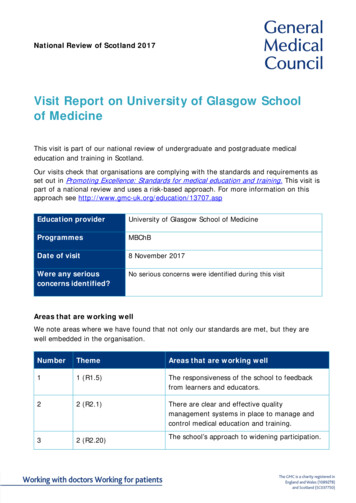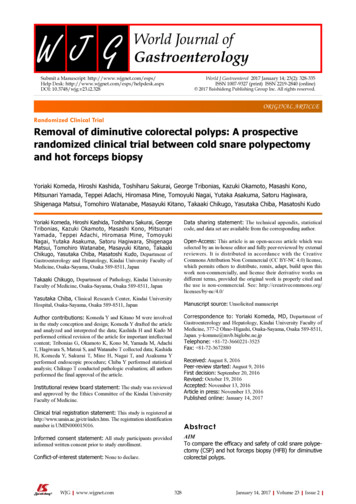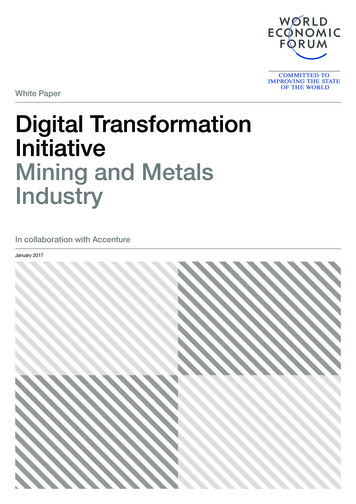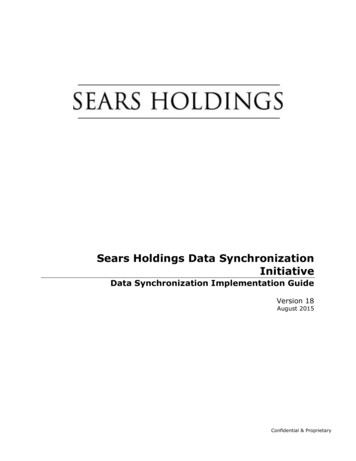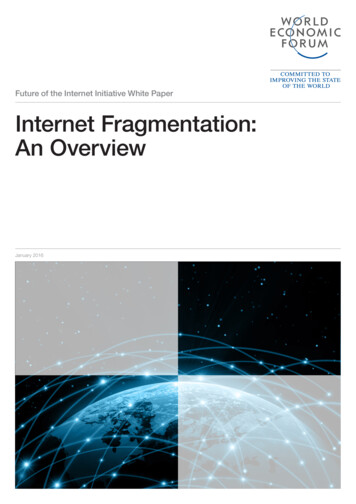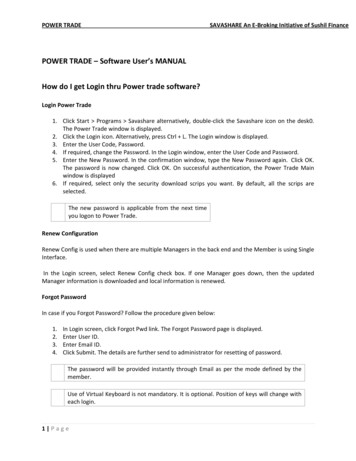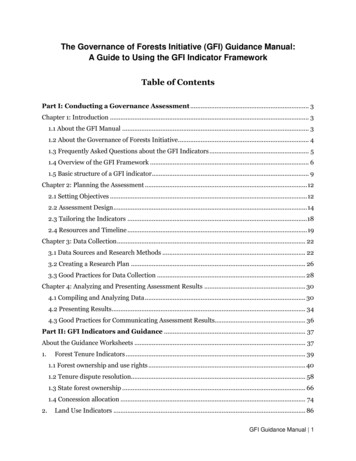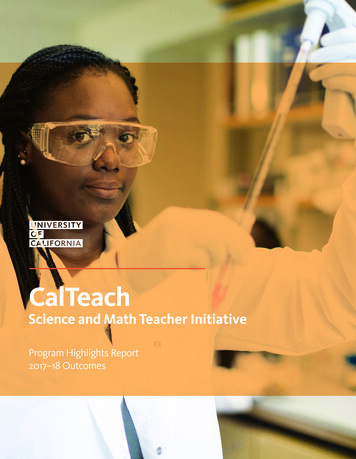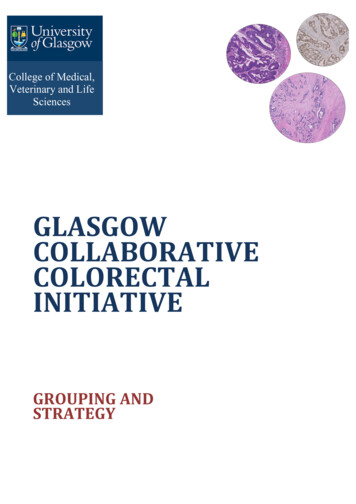
Transcription
College of Medical,Veterinary and VEGROUPING ANDSTRATEGY
OUR GROUPINGThe Cancer Research UK Glasgow Centre is a partnership between the Beatson West ofScotland Cancer Centre, the CRUK Beatson Institute, NHS Greater Glasgow and Clydeand the Universities of Glasgow and Strathclyde.One cancer the centre has chosen to focus on is colorectal cancer and as part of this wehave developed the Glasgow Collaborative Colorectal Initiative (GCCI), which is acollaborative grouping of experts in colorectal cancer research based in Glasgow, UK.The GCCI brings together individual groupings from within Glasgow University, theCRUK Beatson Institute and NHS Greater Glasgow and Clyde, all with a commoninterest in colorectal cancer. By combining our strengths in discovery, translational andclinical research we have the foundations to develop personalised treatment strategiesfor colorectal cancer patients in a true bench to bedside manner. The team is managed bya multidisciplinary collaborative grouping of translational scientists (Dr Joanne Edwardsand Professor Donald McMillan), discovery scientists (Professor Owen Sansom and DrSeth Coffelt), academic surgeons (Mr Campbell Roxburgh and Professor Paul Horgan)and oncologists (Dr Janet Graham).Since the initial formation of this collaborative grouping, the team has strengthened itsacademic resources by developing large comprehensive patient cohorts of linkedclinical data along with extensive in vivo models and investing in state-of-the-artequipment for genomic analysis. The success of such an approach has beendemonstrated in the research outputs that resulted in all members of the managementteam being returned in the 2014 REF.UniversityBeatsonInstituteNHS
The aim of the GCCI is to better understand the determinants of short and long-termoutcomes in patients with colorectal cancer. In particular, the relationship between thelocal and systemic inflammatory responses, tumour microenvironment and cell signallingis being examined with a view to taking such knowledge into the routine clinicalmanagement of colorectal cancer. Our collective aim is to develop novel treatmentstrategies to establish a personalised medicine approach for colorectal cancer.COLLABORATIONSUniversity ofDublinSørlandetHospital NorwayAmsterdamMedical CentreUniversity ofSydneyMemorial SloanKettering New York Sansom Group Coffelt Group Edwards Group Biankin Group Horgan Group Graham GroupRESEARCH EXPERTISETranslational Scienceand GenomicsClinical Research andClinical TrialsNew prognostic and predictive testsNew therapeutic strategiesImproved outcomes and efficiencyMedical ResearchCouncil (MRC)OUTPUT AND AIMPrecision medicine approach for Colorectal CancerGlasgow PolyomicsFUNDERS/INDUSTRIAL PARTNERSNHS ResearchScotland GGCBiorepositoryGreater Clyde andGlasgow NHSRESEARCH GROUPSBasic Science andAnimal ModelsNHS GGC SafeHavenWolfson Wohl CancerResearch Centre (UoG)BioClavisRESEARCH FACILITIESBeatson Institute ofCancer ResearchCancer Research UKRESEARCH CENTRESDokkyo MedicalUniversityTo achieve these aims strong academic collaborations have been established to utilise theexpertise of the colorectal cancer community: Professor JP Medema and Dr Louis Vermeulen, AMC, The NetherlandsDr Christian Kersten, Sorlandet Hospital NorwayDr Marty Weiser, Memorial Sloan Kettering, USAProfessor Keiran Sheehan and Dr Liz Ryan, University of Dublin, IrelandProfessor Ishizuka and Kubota, Dokkyo Medical University, JapanProfessor Stephen Clarke, University of Sydney, AustraliaThe group also has a working relationship with the NHS Tissue Biorepository and SafeHaven, allowing access to important clinical trial specimens and data. Furthermore, anindustrial partnership with BioClavis will give the grouping access to exciting newtechnologies to push colorectal cancer research forward.
RESEARCH EXPERTISEThe GCCI has a wealth of expertise across discovery, translational and clinical scienceallowing us to quickly move from bench to bedside.The CRUK Beatson Institute hosting Professor Owen Sansom and Dr Seth Coffelt is aworld-leading centre for basic colorectal cancer research. Their research focuses on thedrivers of colorectal metastasis. Central to this work is the use of novel inducible modelsof colorectal tumourigenesis that allow the study of functions related to specific genes andinflammation.The Wolfson Wohl Cancer Research Centre is a state-of-the-art translational sciencefacility hosting the teams of Professor Andrew Biankin, Dr Joanne Edwards and MrCampbell Roxburgh. Their work focuses on linking genomics, the tumourmicroenvironment and signal transduction mechanisms to inform on response to therapy.Central to this work is large colorectal tissue microarrays allowing identification ofclinically relevant prognostic and predictive biomarkers and a state-of-the-art genomicssuite allowing assessment of the genomic landscape of the tumours.The Glasgow Royal Infirmary is a leading centre for clinical research hosting the team ofProfessors McMillan and Horgan. Their work has highlighted the importance of thesystemic and local inflammatory response in colorectal cancer. This has led to theintroduction of the Glasgow Prognostic Score (GPS) and Glasgow MicroenvironmentScore (GMS) as prognostic markers for colorectal cancer. Central to this work is the largeclinical databases created by the team. The Beatson West of Scotland Cancer Centre is thesecond largest cancer treatment centre in Europe, serving a population of 2.6 million. Thetreatment centre has ECMC status and hosts the CRUK Clinical Trials Unit, providingaccess to colorectal cancer clinical trial specimens and data. Dr Janet Graham’s team takesa lead on a broad portfolio of early and late phase colorectal trials within the centre.Beatson Institute ofCancer ResearchWolfson Wohl CancerResearch Centre (UoG)Greater Glasgow andClyde World renowned CRUKfunded centre for basicresearch into cancerdevelopment andprogression State of the art centre fortranslational cancerresearch Leading hospital-basedcentres for clinical cancerresearch Large colorectal cancertissue resources Large clinical databasesand tissue collection Polyomics and Genomicexpertise GEM and xenograftmodels for colorectalcancer research Drug discoveryprogramme to identifynovel cancer therapeutics Expertise in biomarkerresearch Access to NHS ResearchScotland’s GGC tissueBiorepository: colorectaltumour specimens suchas the SCOT clinical trial Expertise in cell functionand signalling Collaborative researchbetween scientist andclinicians Clinical expertise incolorectal cancer surgeryand oncology
College of Medical,Veterinary and VERESEARCHDISCOVERY RESEARCHResearch Interests Understanding the early changes associated with intestinal neoplasia to identify novelmarkers of disease and new targets for therapyThe role of the APC gene in sporadic cancersThe use of novel inducible mouse models of colorectal tumourigenesis to study thefunctions of specific tumour suppressor genesThe study of the dichotomous roles of immune cells and how tumours control immune cellbehaviourUnderstanding how immune cells participate in the metastatic process to develop newimmunotherapies that counteract metastatic lesionsResources In vivo mouse models of colorectal tumourigenesisGEM models of consensus molecular subtypes and metastatic diseaseOrthotopic xenograft modelsColorectal and immune cell linesSelected Publications Coffelt SB, Kersten K, Doornebal CW, Weiden J, Vrijland K, Hau C, Verstegen NJM,Ciampricotti M, Hawinkels LJAC, Jonkers J, de Visser KE. IL-17-producing gd T cells andneutrophils conspire to promote breast cancer metastasis. Nature. 2015. 522:345-8Myant KB, Cammareri P, Hodder MC, Wills J, Von Kriegsheim A, Gyorffy B, Rashid M,Polo S, Maspero E, Vaughan L, Gurung B, Barry E, Malliri A, Camargo F, Adams DJ,Iavarone A, Lasorella A, Sansom OJ. HUWE1 is a critical colonic tumour suppressor genethat prevents MYC signalling, DNA damage accumulation and tumour initiation. EMBOMol Med 9: 181-97, 2017
TRANSLATIONAL RESEARCHResearch Interests Assessment of tumour-associated inflammation and stromal infiltration as prognosticbiomarkersThe development of strategies to pre-operatively assess the tumour microenvironmentThe relationship between signal transduction and inflammatory response in relation topatient outcomeThe use of tumour signalling pathways to predict prognosis and response to therapyDevelopment of a clinically translatable subtyping method based on histological analysis toclassify patient by prognosis and predict response to therapyThe use of genomics to evaluate RNA expression and DNA mutational landscaping ofcancers to provide biomarkers to inform clinical trial designCharacterising the genomic, transcriptomic and epigenomic aberrations in cancer, andextending this to a personalised model of cancer care, where molecular characteristicsguide treatment decisions.Resources Established 274 stage I-III colorectal cancer patient tissue microarray with matched clinicaldata from Glasgow Royal Infirmary 1997-2007Established 750 stage I-IV colorectal cancer patient tissue microarray with matched clinicaldata from Western Infirmary and Stobhill hospitals from 1997-2007 (MSI data availablefor all patients)New 1000 stage I-III colorectal cancer patient tissue microarray with matched clinical datafrom Glasgow Royal Infirmary from 1997-2013New 190 T1-T2 screen detected colorectal cancer patient tissue microarray with matchedclinical data from Greater Glasgow and Clyde Hospitals from 2009-2011State-of-the-art genomics suite with custom 150 and 250 cancer mutation panelsSelected Papers Richards, C. H., Roxburgh, C. S.D., Powell, A. G., Foulis, A. K., Horgan, P.G. and McMillan, D. C. (2014) The clinical utility of the local inflammatory response incolorectal cancer. European Journal of Cancer, 50(2), pp. 309-319.Park, J.H., McMillan, D.C., Horgan, P.G. and Roxburgh, C.S.D. (2015) The clinical utilityof a tumour microenvironment-based histopathological score in patients with primaryoperable colorectal cancer. Journal of Clinical Oncology, 33(3).Roseweir, A. K., McMillan, D. C., Horgan, P. G. and Edwards, J. (2017) Colorectal cancersubtypes: Translation to routine clinical pathology. Cancer Treatment Reviews, 57, pp. 1-7.Biankin, A.V. (2017) The road to precision oncology. Nature Genetics, 49(3), pp. 320-321.Bailey, P. et al. (2016) Genomic analyses identify molecular subtypes of pancreaticcancer. Nature, 531(7592), pp. 47-52.
CLINICAL RESEACHResearch Interests Prognostic value and determinants of pre-operative cancer-associated systemicinflammationWorldwide comparisons of systemic inflammation in colorectal cancerThe role of post-operative systemic inflammation in short and long-term outcomesCan immune cell responses and expression of MHC-1, PD-1 and PD-L1 be measured onsequential tumour biopsies to provide an assessment of patterns of immune priming inresponse to chemoradiotherapy?Are there gene signatures that can be applied to stratify a subset of patients by degree ofimmunogenicity present at baseline and during treatment?Assessment of different treatment regimens in colorectal cancer clinical trialsResources Population-level clinicopathological data for patients diagnosed with colorectal cancer inWest of Scotland (2011-2014)Clinicopathological data from first round of National Bowel Screening Programme NHSGG&C (2009-2011)Prospectively maintained dataset of patients undergoing resection of colorectal cancer inGlasgow Royal Infirmary (1997-onwards, 1700 patients to date)SCOT trial tissue specimens, blood samples and patient dataSelected Papers Canna, K., McArdle, C. and McMillan, D. (2003) Systemic inflammatory response predictssurvival following curative resection of colorectal cancer. British Journal of Surgery, 90,pp. 215-219.Park, J. H. et al. (2017) Staging the tumor and staging the host: A two centre, two countrycomparison of systemic inflammatory responses of patients undergoing resection ofprimaryoperablecolorectalcancer. 7.08.044.Watt, D., Mcsorley, S.T. , Park, J.H., Horgan, P.G. and McMillan, D.C. (2017) Apostoperative systemic inflammation score predicts short- and long-term outcomes inpatients undergoing surgery for colorectal cancer. Annals of Surgical Oncology, 24(4), pp.1100-1109.Andrea Cercek, Campbell SD Roxburgh, et. al. (2017) Total neoadjuvant chemotherapy tofacilitate delivery and tolerance of systemic chemotherapy and response in locallyadvanced rectal cancer. Journal of Clinical Oncology. 35:15 suppl, 3519-3519.C-Reactive Protein structure
GLASGOWCOLLABORATIVECOLORECTALINITIATIVECollege of Medical,Veterinary and LifeSciencesTEAMSenior Management TeamJ EdwardsA BiankinC RoxburghO SansomD McMillanS CoffeltP HorganJ GrahamSenior Lecturers and LecturersA RoseweirD ChangJ ParkP BaileyC SteeleD MansouriS McSorleyLiz MusgroveResearchersTechnical StaffResearch Associates/Post docsPhD studentsScientific officersTechniciansData ManagersDevelopersClinical Research FellowsBioinformaticiansCONTACT USDiscovery .ukTranslational ir@glasgow.ac.ukClinical glasgow.ac.ukjanet.graham@ggc.scot.nhs.ukWolfon Wohl Cancer Research Centre, Garscube Estate, Glasgow, Scotland, G61 1QH, UK
The GCCI has a wealth of expertise across discovery, translational and clinical science allowing us to quickly move from bench to bedside. The CRUK Beatson Institute hosting Professor Owen Sansom and Dr Seth Coffelt is a world-leading centre for basic colorectal cancer research. Their research focuses on the drivers of colorectal metastasis.

